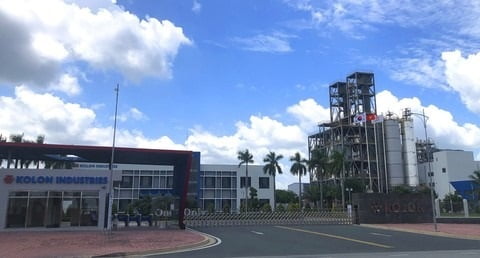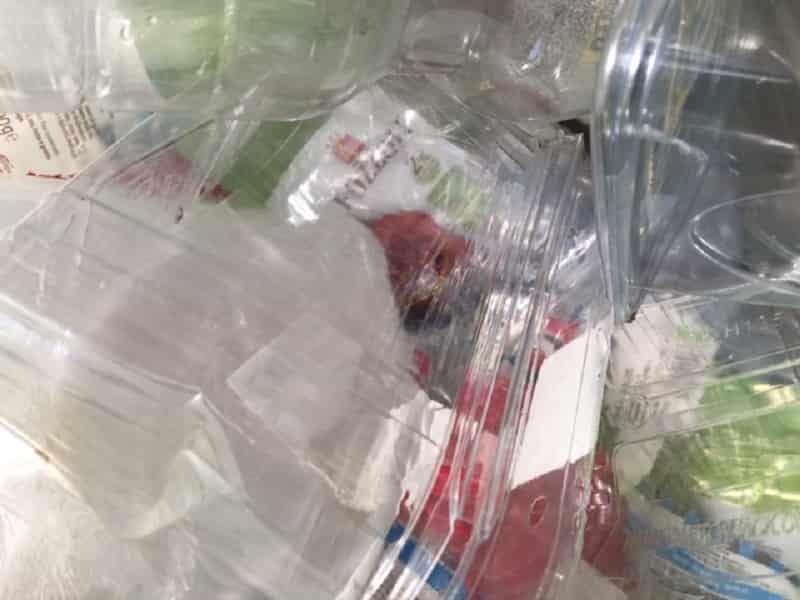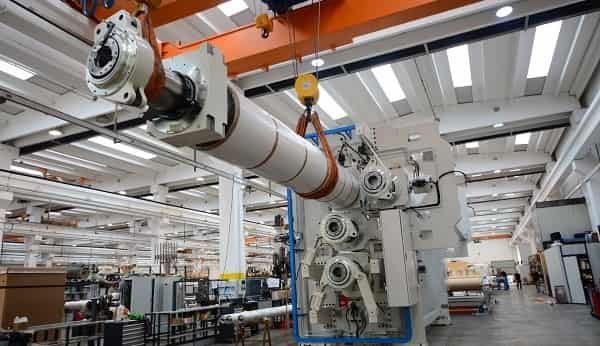Polymer-Additives – Flake-Sorter 07-10-2022 - Arhive
Polymer-Additives – Flake-Sorter
Crude Oil Prices Trend

-Kolon Industries completes tire cord expansion in Vietnam
Group’s total production capacity rises to 103ktpa to meet post-Covid demand
Kolon Industries has completed an expansion project at its tire cord production facility in Vietnam, four years after opening the plant in Binh Duong Province, north of Ho Chi Minh City.
With the expansion, the South Korean industrial materials and chemicals supplier has now increased production capacity for PET tire cords to 19,200 tonnes a year, up from 16,800 tonnes previously.
The project, said Kolon in a 28 Sept statement, brings the group’s total tire cord production to 103,200 tonnes per annum.
The Korean supplier said the move will reinforce its tire cords business, by securing a production base which offers both ‘technology and price competitiveness’.
The plant, said Kolon, features “a consistent production system from yarn spinning to weaving, processing, heat treatment, and finished products.”
According to the group, the project has been in line with the growth of the global tire market.
“Demand for replacement tires increased last year, and shipments of new vehicle tires increased this year,” said the Korean supplier.
Citing an automotive market research agency, Kolon said the tire market is recovering to its pre-Covid level as of this year and is expected to grow at an annual average of 4%.

-New research “major step” toward perpetually recyclable plastic
New research from CU Boulder, published in Nature Chemistry, details how a class of durable plastics widely used in the aerospace and microelectronics industries can be chemically broken down into their most basic building blocks and then formed once again into the same material.
CU Boulder says this is a major step in the development of repairable and fully recyclable network polymers, a particularly challenging material to recycle, as it is designed to hold its shape and integrity in extreme heat and other harsh conditions.
The study documents how this type of plastic can be perpetually broken down and remade, without sacrificing its desired physical properties, the research university says.
CU Boulder says the results also suggest that revisiting the chemical structures of other plastic materials could lead to similar discoveries of how to fully break down and rebuild their chemical bonds, enabling the circular production of more plastic materials in our daily lives.
Our chemical methods can help create new technologies and new materials.
CU Boulder says the research shows the scientists reversed a chemical method and discovered they can both break and form new chemical bonds in a particularly high-performance polymer.
They do this by breaking the polymer—”poly” meaning “many”—back into singular monomers, its molecules, a concept of reversible or dynamic chemistry.
The research university says this latest method is novel as it has not only created a new class of polymer material that is easy to build, break apart and rebuild over and over but the method can be applied to existing especially hard-to-recycle polymers.
Lead author of the study and chair of the chemistry department, Wei Zhang, said: “We are thinking outside the box, about different ways of breaking chemical bonds. Our chemical methods can help create new technologies and new materials, as well as be utilised to help solve the existing plastic materials crisis.”
“This chemistry can also be dynamic, can be reversible, and that bond can be reformed. We are thinking about a different way to form the same backbone, just from different starting points.”
This advance in the closed-loop recycling of plastics is inspired by the natural world.
“It can really benefit future design and development of plastics to not only create new polymers, but it’s also very important to know how to convert, upcycle and recycle older polymers.”
“By using our new approach, we can prepare many new materials, some of which could have similar properties to the plastics in our daily life.”

-European rubber & plastics machinery industry “well-positioned despite crisis”
Italian domestic machinery market continues growth
Euromap anticipates 21% increase in polymer demand by 2026
The European rubber & plastics machinery association Euromap is upbeat about the future of the industry despite current energy and raw material headwinds.
While production value is set to remain flat year-on-year at €15 billion in 2022, the industry is set for growth over the next four years, said Euromap in a 5 Oct pre-K presentation.
“Looking at the trend of the last twelve years, a steady growth in production can be observed,” it added.
“The demand for processing machinery and equipment is evident in all major sales markets and will continue to grow,” the association added, noting an estimated growth of 21% in demand for plastics and polymers between 2021 and 2026.
According to Euromap data, over the past decade global exports of plastics and rubber machinery doubled from €12 billion in 2001 to €24 billion in 2021.
While Europe continues to lead the deliveries, its share of the exports fell from 54.6% of the total to 46.6% during the 10-year period.
The share of Chinese exports, on the other hand, grew “over-proportionately” from less than 2% to 24% percent.
In terms of production, total global output value grew from €17 billion in 2001 to €39 billion in 2021.
Europe’s production share fell from just under 55% to 40% during the decade while China’s share grew from 6.4% to 35%, according to Euromap data.
Noting that the order situation is currently restrained in Europe, the association stressed that the European plastics and rubber machinery industry “does not have a structural problem.”
“Like the plastics industry as a whole, it [machinery industry] is currently facing a variety of challenges,” it added.
Euromap said the supply chain problem within the industry has still not been eased while “the prices for gas and steel are exploding.”
According to a September survey by the machinery arm of German mechanical engineers association (VDMA), only 3% of respondents said they faced no supply disruptions during the month.
By contrast, 60% said they faced “serious disruptions” in supply chain.
“To put this into perspective, gas only covers a quarter of Europe’s energy needs; before the shortage, 40% of this came from Russia.
“Currently, it is only 8%, and the gas storage facilities are well filled,” it added.
As a result, Euromap stressed that it was important to develop or expand alternative, regenerative energy sources now.
As for the upcoming K 2022 major trade fair, Euromap said the industry was “in the midst of the transformation process towards a circular economy.”
“The current situation with rising energy and raw material prices is seen as a confirmation, rather than an obstacle, to consistently continue along this path,” it said

-EPCA ’22: Europe highest cost chemicals producing region, shutdowns encourage imports
Collaboration Creates Recycled and Recyclable Flexible Package
At K 2022, Saperatec, Wentus, and Henkel will present a recyclable package made with 35% PCR.
At the upcoming K 2022 in Dusseldorf, a prototype flexible detergent package will highlight technology from three companies. The companies — Henkel, Saperatec, and Wentus — created the prototype package, called the Wentoplex Pure R, with circularity in mind.
The process begins with composite beverage carton waste, made of paper, aluminum, and LDPE. Saperatec’s mechanical process for delaminating composite materials is used to separate the layers and recover LDPE. The recycled LDPE is then incorporated into the inner sealing layer of the new package to achieve 35% PCR.
Wentus designed and manufactured the package prototype. Its bilayer, all-polyethylene design is intended to enable further recycling. Henkel supplies the package’s adhesive, which is also optimized for future recycles.
The prototype will be presented by Saperatec engineers in Hall 9, Stand D17 at K 2022.

-Collaboration Creates Recycled and Recyclable Flexible Package
At K 2022, Saperatec, Wentus, and Henkel will present a recyclable package made with 35% PCR.
At the upcoming K 2022 in Dusseldorf, a prototype flexible detergent package will highlight technology from three companies. The companies — Henkel, Saperatec, and Wentus — created the prototype package, called the Wentoplex Pure R, with circularity in mind.
The process begins with composite beverage carton waste, made of paper, aluminum, and LDPE. Saperatec’s mechanical process for delaminating composite materials is used to separate the layers and recover LDPE. The recycled LDPE is then incorporated into the inner sealing layer of the new package to achieve 35% PCR.
Wentus designed and manufactured the package prototype. Its bilayer, all-polyethylene design is intended to enable further recycling. Henkel supplies the package’s adhesive, which is also optimized for future recycles.
The prototype will be presented by Saperatec engineers in Hall 9, Stand D17 at K 2022.
∼∼∼∼∼∼∼∼∼∼∼∼∼∼∼∼∼∼∼∼
-Hallstar Acquires Lanxess’ Polymer Additives Production site in Greensboro, N.C.
Hallstar is gaining new product lines of brominated flame retardants and phthalate-free plasticizers including benzoate and citrate esters.
Chicago-headquartered specialty chemical company Hallstar has completed the acquisition of the Greensboro, N.C., ester manufacturing facility of Lanxess, expanding Hallstar’s manufacturing capacity, product portfolio and employee roster. As part of the acquisition, Hallstar is gaining new product lines of brominated flame retardants and phthalate-free plasticizers including benzoate and citrate esters. These products will be added to Hallstar’s portfolio of well-known brands for the industrial market – Plasthall, Paraplex, Maglite, Dioplex, Staflex and TegMeR. These polymer modifiers are for use in plastics such as PVC, PET/PBT, PLA/PHA/PSM, and SMC.
Said Hallstar chairman and CEO John J. Paro, “Our goal was to close this deal in the fourth quarter of the calendar year and, thanks to the outstanding efforts of Hallstar’s transition team and the cooperation of Lanxess’ local and global organization, we achieved that. We are proud to welcome the Greensboro operation, including all of its knowledgeable employees, to the Hallstar team.

-GAIA: Reducing Waste is a Climate Game Changer
The introduction of ‘zero waste’ systems in cities around the world would be one of the quickest and most affordable ways to reduce global heating, says a new report released by Global Alliance for Incinerator Alternatives (GAIA).
The ‘Zero Waste to Zero Emissions: How Reducing Waste is a Climate Game Changer’ report is published ahead of the November COP27 climate change discussions in Sharm El-Sheikh (Egypt), which will have waste as one of its key topics. According to the report, the reduction of greenhouse gas emissions thanks to the implementation of zero waste systems would amount to 1.4 billion tonnes, equivalent to the annual emissions of 300 million cars, much more than taking all cars off the road in the European Union for a year.
GAIA, who will have a delegation present at the summit, urges global leaders to take urgent and bold action on zero waste to meet the 1.5°C target by:
Incorporating zero waste goals and policies into climate mitigation and adaptation plans;
Prioritising food waste prevention and single-use plastic ban;
Investing in waste management systems, recycling, and composting capacity;
Establishing institutional frameworks and financial incentives for zero waste, including regulations, educational and outreach programs, and subsidies to recycling and composting.
Report co-author Dr. Neil Tangri of GAIA said: “Better waste management is a climate change solution staring us in the face. It doesn’t require flashy or expensive new technology-it’s just about paying more attention to what we produce and consume, and how we deal with it when it is no longer needed.”
“Without concrete commitment from global leaders to zero waste, we will not be able to meet the 1.5° C climate target.”, added co-author Mariel Vilella, Director of GAIA’s Global Climate Program.
“Previous climate talks have largely overlooked the potential of reforms to the waste sector, particularly for reducing methane, which over 100 countries have now pledged to do. We now have a unique opportunity to put waste firmly on the agenda. Zero waste strategies are the easiest way to rapidly and cheaply bring down emissions, while building climate resilience, creating jobs, and promoting thriving local economies.”
The GAIA report and its conclusions have also drawn praise from Janez Potočnik, Co-Chair of the International Resource Panel of the UN Environment Programme, former European Commissioner for the Environment, who states: “This report demonstrates the huge importance of aligning our waste systems with climate goals. It shows how cities are already working to eliminate greenhouse gas emissions from waste while building climate resilience and creating livelihoods. It highlights the absolute necessity of reducing root sources of waste through changing our production and consumption patterns-using all the tools at our disposal to achieve the deep emissions reductions we need.”
The report provides global case studies of how zero waste cities bring about socio-economic and political benefits besides helping to tackle climate change. In Europe, this is visible through Zero Waste Europe’s (GAIA’s European branch) network of Zero Waste Cities and the report singles out the city of Lviv (Ukraine).
∼∼∼∼∼∼∼∼∼∼∼∼∼∼∼∼∼∼∼∼
Our highest performance and most versatile flake sorter
Achieve maximum purity yields for high-end applications such as bottle to bottle recycling
With a combination of our most powerful sensor technologies, AUTOSORT™ FLAKE offers consistent and exceptional sorting performance. Its high-speed valves eject even the smallest contaminates with maximum precision to meet extremely high purity requirements.
The high performance flake sorter features an integrated light source, continuous signal correction and enhanced light distribution to ensure stable sorting performance and minimal downtime. Its high sensitivity electromagnetic sensor detects even the smallest non-ferrous metals and ferrous metals (as small as 1 mm) for maximum purity yields.
Setting new benchmarks worldwide, AUTOSORT™ FLAKE is the ideal sorting solution for high purity end products. What’s more, its operational efficiency is cost-effective and requires little maintenance.

